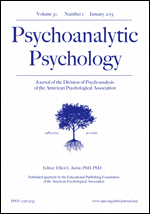
PSYCHOANALYTIC PSYCHOLOGY
Scope & Guideline
Connecting Theory and Practice in Clinical Psychology
Introduction
Aims and Scopes
- Integration of Psychoanalytic Theory and Empirical Research:
The journal emphasizes the importance of grounding psychoanalytic theory in empirical research, fostering a dialogue between clinical practice and scientific inquiry. - Exploration of Psychopathology and Treatment Approaches:
Psychoanalytic Psychology covers various psychopathologies and their treatment, including personality disorders, trauma, and psychosis, highlighting innovative therapeutic techniques. - Interdisciplinary Perspectives:
The journal incorporates insights from philosophy, sociology, and cultural studies, enriching psychoanalytic discourse with diverse viewpoints and methodologies. - Focus on Developmental and Attachment Issues:
The exploration of attachment theories and developmental psychopathology is a core area, examining how early relationships influence later psychological functioning. - Cultural and Societal Contexts of Psychoanalysis:
Psychoanalytic Psychology considers the impact of cultural and societal factors on mental health, particularly in contexts of conflict, such as war and displacement. - Innovation in Psychoanalytic Techniques:
The journal highlights advancements in psychoanalytic techniques, including the adaptation of therapy during crises like the COVID-19 pandemic.
Trending and Emerging
- Impact of the COVID-19 Pandemic on Mental Health:
A significant increase in research related to the psychological effects of the COVID-19 pandemic, particularly regarding teletherapy, trauma, and the mental health of vulnerable populations. - Interdisciplinary Approaches to Psychotherapy:
Emerging themes emphasize the integration of various disciplines, such as neuroscience and sociology, into psychoanalytic practice, enhancing the understanding of complex psychological phenomena. - Focus on Social Justice and Cultural Contexts:
A growing emphasis on the intersection of psychoanalysis with social justice issues, exploring topics such as race, gender, and identity, particularly in the context of trauma and marginalization. - Advancements in Technology and Psychoanalysis:
Research on the implications of technology in therapy, including remote treatment modalities and their effects on the therapeutic alliance, is becoming increasingly relevant. - Complexity of Identity and Gender Issues:
There is a notable trend towards exploring identity formation, particularly concerning transgender experiences and the psychological dynamics surrounding gender identity.
Declining or Waning
- Traditional Freudian Concepts:
There appears to be a decreased emphasis on classical Freudian concepts in favor of more contemporary psychoanalytic theories, indicating a shift towards modern interpretations and applications of psychoanalysis. - Purely Theoretical Discourse:
The journal has moved away from abstract theoretical discussions without empirical grounding, focusing instead on practical implications and research-backed insights. - Narrowly Defined Pathologies:
There is a noticeable reduction in papers exclusively addressing narrow or less relevant pathologies, as the journal increasingly embraces broader, more integrative approaches to mental health. - Lack of Focus on Historical Psychoanalysis:
Historical analyses of early psychoanalysts and their theories have diminished, suggesting a trend towards more current and applicable psychoanalytic practices.
Similar Journals

FORUM DER PSYCHOANALYSE
Championing Scholarly Discourse in Mental HealthFORUM DER PSYCHOANALYSE, published by SPRINGER, is a distinguished German journal dedicated to the fields of Clinical Psychology and Psychiatry and Mental Health. With an ISSN of 0178-7667 and an E-ISSN of 1437-0751, this journal plays a crucial role in the dissemination of contemporary psychoanalytic theory and practice. Recognized with a Q3 ranking in both Clinical Psychology and Psychiatry and Mental Health for 2023, it serves as a vital resource for researchers and practitioners seeking to explore the intersection of psychoanalytic thought with current clinical practices and mental health paradigms. Since its inception in 1987, FORUM DER PSYCHOANALYSE has provided a platform for rigorous peer-reviewed articles, detailed case studies, and theoretical explorations, fostering a vibrant community of psychoanalysts and mental health professionals. As an essential publication for those engaged in psychoanalytic research and clinical applications, it upholds high scholarly standards while contributing to the ongoing discourse in mental health and psychoanalysis.

PSYCHOLOGY AND PSYCHOTHERAPY-THEORY RESEARCH AND PRACTICE
Empowering Minds with Cutting-Edge InsightsPsychology and Psychotherapy - Theory, Research and Practice is a premier academic journal published by Wiley, which has established itself as a critical platform for the dissemination of cutting-edge scholarship in the fields of psychology and psychotherapy. With a strong emphasis on both theoretical frameworks and practical applications, this journal serves a diverse audience that includes researchers, clinicians, and students alike. The journal holds a prestigious impact factor and consistently ranks in the Q1 category across multiple fields, including Clinical Psychology, Developmental and Educational Psychology, and Psychiatry and Mental Health. With a rich history dating back to the 1920s and ongoing contributions until 2024, Psychology and Psychotherapy provides open access options to ensure widespread dissemination of knowledge. By publishing empirical studies, reviews, and theoretical propositions, the journal aims to advance the understanding of psychological processes and the efficacy of therapeutic practices, thereby playing a vital role in the ongoing discourse within the mental health community.
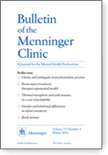
BULLETIN OF THE MENNINGER CLINIC
Fostering interdisciplinary dialogue in clinical psychology.The BULLETIN OF THE MENNINGER CLINIC, an esteemed publication of GUILFORD PUBLICATIONS INC, has been a pivotal resource in the fields of Clinical Psychology and Psychiatry since its inception in 1945. With ISSN 0025-9284 and E-ISSN 1943-2828, this journal is recognized for its commitment to advancing knowledge and practices in mental health. Indexed in Scopus with respectable rankings across various categories, it stands in the Q3 quartile for both Clinical Psychology and Psychiatry and Mental Health, indicating its role as a significant contributor to academic discourse. Although it operates under a subscription model, the journal features a broad spectrum of peer-reviewed articles, case studies, and research findings that are essential for professionals, researchers, and students dedicated to understanding and improving mental health care. The BULLETIN OF THE MENNINGER CLINIC serves as a vital platform for interdisciplinary dialogue, fostering innovative approaches and methodologies that shape the future of mental health treatment and research.

Psychoanalytic Study of the Child
Uncovering the nuances of child development through psychoanalysis.Psychoanalytic Study of the Child is a distinguished journal published by Routledge Journals, Taylor & Francis Ltd, focusing on the intersection of psychoanalysis and child development. Established in 1945, this journal provides a platform for rigorous research and theoretical frameworks that advance our understanding of children's psychological experiences and developmental processes. With an ISSN of 0079-7308 and E-ISSN 2474-3356, it rigorously evaluates submissions that span various disciplines, reflected in its 2023 category quartiles, which include Q2 in Pediatrics, Perinatology and Child Health and Q3 in Developmental and Educational Psychology, as well as Psychiatry and Mental Health. Although it does not currently offer open access, the journal maintains a commitment to high-quality publication standards and impactful research that contributes to the ongoing dialogue within its field. Researchers, professionals, and students alike will find valuable insights and significant advancements in child psychoanalysis within its pages, making it an essential resource for academia and clinical practice.

Research in Psychotherapy-Psychopathology Process and Outcome
Pioneering studies that shape the future of mental health.Research in Psychotherapy-Psychopathology Process and Outcome is a prominent Open Access journal dedicated to advancing the field of clinical psychology and psychiatry. Published by SPR ITALIA since 2011, the journal focuses on empirical research that explores the intricate relationships between psychotherapy processes and outcomes, contributing significantly to evidence-based practices in mental health. With an ISSN of 2239-8031, it holds a commendable spot in the academic community, ranking in the Q2 category for Clinical Psychology and Q3 for Psychiatry and Mental Health as of 2023. The journal's impact is further underscored by its Scopus rankings, positioning it at 114 out of 311 in Clinical Psychology and 256 out of 567 in Psychiatry and Mental Health. Notably, this journal has embraced Open Access since 2013, ensuring that vital research is readily available to professionals, researchers, and students alike. Based in Milan, Italy, it serves as a vital platform for emerging studies and discussions that shape contemporary psychotherapy practices and enhance understanding of psychopathological processes.

Journal of Experimental Psychopathology
Fostering Global Dialogue on Experimental PsychopathologyJournal of Experimental Psychopathology, published by SAGE Publications Ltd, stands as a pivotal platform for advancing the understanding of psychological disorders and their underlying mechanisms. Established in 2015, this open access journal encourages a broad dissemination of research findings, adhering to its mission to foster innovation in the fields of Clinical Psychology and Psychiatry and Mental Health. With an established impact recognized in its Q3 quartile rankings for both fields as of 2023, the journal aims to bridge the gap between experimental research and clinical application. Researchers, professionals, and students are invited to engage with cutting-edge studies, all while benefiting from the journal's commitment to open access publishing since 2018, ensuring that knowledge is easily accessible to all. The journal’s office is strategically located in London, UK, serving a global academic community keen on exploring the complexities of psychopathology.
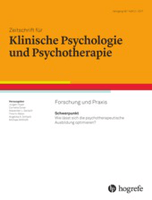
ZEITSCHRIFT FUR KLINISCHE PSYCHOLOGIE UND PSYCHOTHERAPIE
Transforming Understanding through Scholarly ExcellenceZEITSCHRIFT FUR KLINISCHE PSYCHOLOGIE UND PSYCHOTHERAPIE is a distinguished academic journal published by HOGREFE VERLAG, renowned for its commitment to advancing the fields of clinical psychology and psychotherapy. With its inception dating back to 1974, this journal has been a vital platform for disseminating cutting-edge research, innovative therapeutic techniques, and critical reviews in the realm of clinical psychology. The journal currently holds an impact factor that reflects its significance in the academic community, with a category rank of Q3 in Clinical Psychology according to 2023 quartiles. Although it operates without open access, ZEITSCHRIFT FUR KLINISCHE PSYCHOLOGIE UND PSYCHOTHERAPIE provides invaluable insights and rigorous scholarly work that are essential for researchers, professionals, and students seeking to deepen their understanding of psychological practices and theories. Located in Göttingen, Germany, the journal maintains its relevance by converging topics from various periods, ensuring a comprehensive review of evolving methodologies and psychosocial interventions from 1996 to 2024.
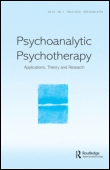
Psychoanalytic Psychotherapy
Illuminating the Intersection of Mind and MethodPsychoanalytic Psychotherapy is a distinguished journal published by Routledge Journals, Taylor & Francis Ltd, focusing on the intersection of psychoanalysis and psychotherapy. Established in the United Kingdom and spanning its influential discourse since 1985, the journal has become an essential resource for researchers, clinicians, and students in the fields of Clinical Psychology and Psychiatry and Mental Health. With an impact factor reflecting its critical role in contemporary mental health discussions, Psychoanalytic Psychotherapy is indexed in Scopus and proudly holds a Q3 ranking in both Clinical Psychology and Psychiatry categories. The journal aims to publish cutting-edge research, theoretical advancements, and clinical applications, fostering a deeper understanding of psychoanalytic principles in therapeutic settings. Although it does not offer Open Access, the journal remains crucial for professionals seeking to explore the latest insights and empirical findings in psychoanalytic therapy.

PSYCHE-ZEITSCHRIFT FUR PSYCHOANALYSE UND IHRE ANWENDUNGEN
Advancing Knowledge in Psychology and Clinical PracticePSYCHE-ZEITSCHRIFT FUR PSYCHOANALYSE UND IHRE ANWENDUNGEN, published by Klett-Cotta Verlag, is a distinguished journal in the field of psychoanalysis, dedicated to exploring the intricate intersections of psychology, clinical practice, and theoretical applications. With a rich history dating back to 1951, this journal offers a platform for innovative research and discourse, contributing significantly to both the clinical psychology and psychiatry domains. While the journal's coverage in Scopus has been discontinued since 2017, it remains an essential resource for scholars and practitioners seeking insights into psychoanalytic theory and its real-world applications. Although it is not currently an open-access journal, its rigorous peer-reviewed articles provide invaluable knowledge and foster academic dialogue that is crucial for advancing the field. With Scopus rankings indicating its relevance and impact within the fields of psychology and mental health, PSYCHE continues to hold a prominent position for those dedicated to the advancement of psychoanalytic thought.
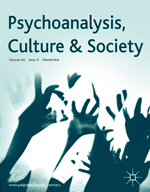
Psychoanalysis Culture & Society
Exploring the Depths of Psychoanalysis in Culture and SocietyPsychoanalysis Culture & Society, published by Palgrave Macmillan Ltd, serves as an essential interdisciplinary journal that explores the rich interconnections between psychoanalytic theory, culture, and societal dynamics. With an ISSN of 1088-0763 and an E-ISSN of 1543-3390, this UK-based journal not only provides a platform for scholarly discourse but also aims to enhance our understanding of how psychoanalysis influences and is influenced by cultural and social factors. As of 2023, it holds notable ranks across various categories in Scopus, including a Q2 status in Cultural Studies and Q4 ranking in Applied Psychology and Social Psychology, indicating its growing impact and relevance in these fields. Although it currently does not offer open access options, its rich content appeals to a broad audience of researchers, professionals, and students dedicated to exploring the complexities of human behavior within cultural contexts. By contributing to the dialogue around psychoanalysis and its applications, this journal continues to advance knowledge and facilitate innovative research in the applied and social sciences.